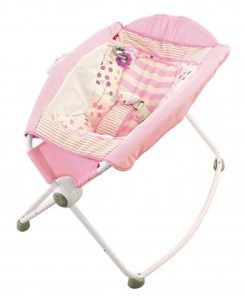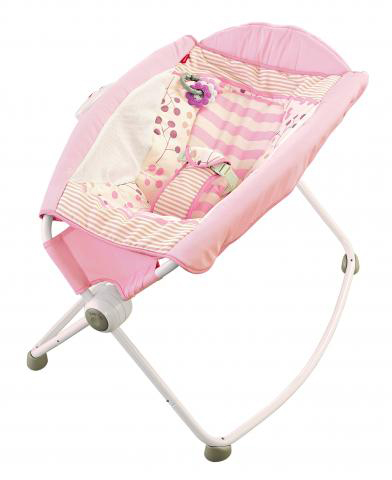Posts Tagged ‘Fisher-Price’
After Millions of Recalls, New Safety Standard Proposed for Infant Sleepers

Fisher-Price recalled its Rock ‘n Play sleeper in April.
Last April, Fisher-Price made its jarring announcement: 10 babies had died in its sleepers after rolling from their backs to their stomachs. Fisher-Price urged parents to take children out of the sleepers once they reach 3 months old or begin turning themselves over.
This advisory didn’t stand. Soon thereafter, Consumer Reports published the results of its own investigation, which identified 32 infant deaths. Within the week, Fisher-Price and Mattel, its parent company, had recalled 4.7 million unsafe sleepers.
Now six months later, The Washington Post reports that 59 babies have died in Rock ‘n Play sleepers. At least two other companies, Kids II and Dorel Juvenile Group USA, have recalled their infant sleeper products. At the time of the recall, 5 infants had died on the Kids II sleepers.
Last week, the Consumer Product Safety Commission (CPSC) proposed a new safety standard for infant sleep products. This would limit the seat back angle for sleep to 10 degrees or less.
Why Was the Fisher-Price Rock ‘n Play So Dangerous?
Fisher-Price introduced the Rock ‘n Play in 2009, inventing the category of inclined sleepers, which allowed babies to sleep at a 30 degree angle. From the start, this design completely disregarded the American Academy of Pediatrics’ safe-sleep guidelines, which recommend babies sleep on their backs in an empty crib or bassinet to avoid accidental suffocation.
One problem was Fisher-Price didn’t do thorough safety testing or consulting with medical experts. But you can’t overlook the fact that Fisher-Price has been a giant in children’s products and how that influenced the discussion. As one pediatrician told The Washington Post, “This is not something I’d recommend using. But parents see that it’s from Fisher-Price and think, ‘They wouldn’t be able to sell anything that isn’t safe.’ ”
New Research Findings
The CPSC asked an assistant professor of orthopedic surgery who specializes in infant biomechanics to lead a study on inclined sleep products. The professor is based at the University of Arkansas for Medical Sciences. She and her team found evidence that babies age 2-6 months on average who were placed in inclined sleep products were at a higher risk of suffocation, when compared to a flat crib mattress.
- Her team concluded that none of the inclined sleep products tested were safe for infant use.
- The university team suggested the angle of the incline be no more than 10 degrees. The lying surface should be flat and rigid, not soft or plush-like.
- The team reported that babies who were placed on their stomach in their sleepers or who rolled over had to exert as much as 200 percent more core strength than those on a flat crib mattress.
- Finally, the university team reviewed police reports and interviews from 91 cases of infant suffocation. In many cases, the caretaker reported they had never seen the infant roll over before.
This was a recurring point in the team’s findings. Many of the children were rolling over for the first time when they were found.
Here is additional information for further reading:
UAMAS Research into Baby Biomecanics Shows Issues with Infant Inclined Sleepers, University of Arkansas
After Infant Deaths, Fisher-Price Rock ‘n Play Sleeper is Recalled, Massachusetts Injury Lawyer Blog
More Infant Sleep Products Linked to Deaths, Consumer Reports
Consumer Product Safety Commission: No More Inclined Sleepers, Chicago Sun Times
Free Consultation – Boston Product Liability Lawyers
With more than 100 years combined experience, Breakstone, White & Gluck specializes in plaintiff representation in product liability cases. We represent clients throughout Massachusetts, from Boston to Cambridge to Plymouth, Brockton and Cape Cod to the North Shore.
If you have been injured, learn your legal rights. For a free legal consultation, contact our firm at 800-379-1244 or 617-723-7676. You can also use our contact form.


